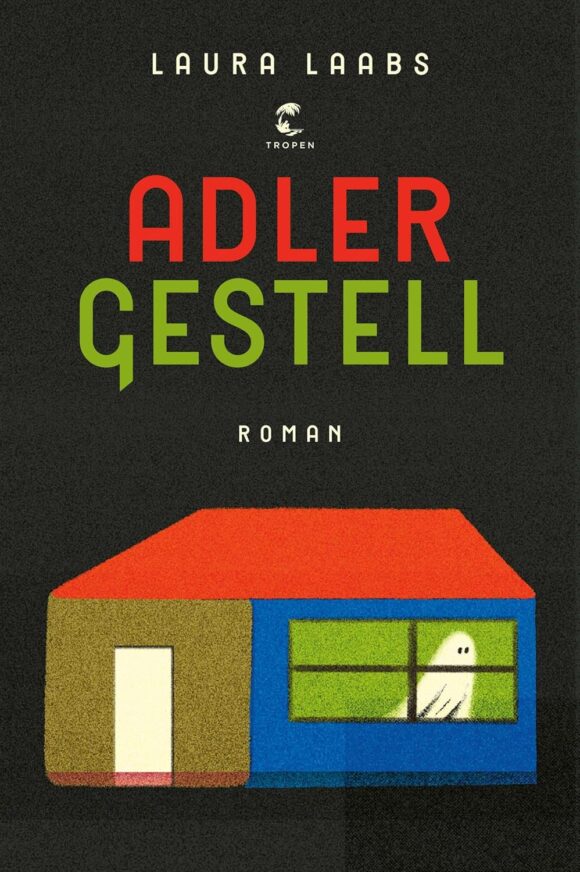
I picked up Adlergestell by Laura Laabs and finished it in just a few sittings — it drew me in more than I expected. Laura and I haven’t seen each other in about twenty years, but we were friends in high school and travelled through Kyrgyzstan together in 2004. Reading her debut novel felt a bit like revisiting that time — not only because of her voice, but because the story hits close to home in more ways than one.
I grew up not far from the book’s setting, just off another side street of the Adlergestell in Berlin-Treptow. Like Laura, I am a Wendekind — born between roughly 1975 and 1985, a child during the transition period. When the Wall fell, we were just starting school (in my case, 1988). We sensed that something enormous was happening, but the real upheaval took place in our parents’ world. Their worries — about jobs, housing, social standing, everything — defined the atmosphere at home, while we absorbed the changes mostly through the textures of everyday life.
In Adlergestell, Laura captures this subtle perspective beautifully. Her young protagonists live more precariously than I did (and, I assume, than she did too), yet their exploration of the “West” — just like ours did — happens largely through the sensory and material world of children: gummies, chewing gum, sticker books, game consoles, the glow of the television screen. I remember that shift well — the moment when the same sweets and TV shows that once seemed distantly “von drüben” suddenly appeared in our local shops. The Iron Curtain melted not only through politics but through the aisles of our local Kaufhalle.
Each chapter opens with a minute, vivid description of TV ads that once played in heavy rotation. Those of us who grew up in the 1990s will instantly recognise the tone — seductive jingles, bright colours, soft-focus family scenes. The ads for Merci and Yogurette pralines stand out in particular, and Laura treats them almost like cultural fossils: tiny artefacts of a new consumerist world seeping into our subconscious and leaving such strong imprints that they evoke intense memories and emotions many years later.
In short, interspersed chapters, we also meet the women surrounding the main characters: a Jewish great aunt, the protagonist’s mother, her Greek ex-partner’s mother, and Chaline’s mother. Through these glimpses, Laura builds a subtle, multi-generational portrait of (East) German womanhood. One reviewer suggested that the women in this story “do not have fate in their own hands” — an interesting observation that underlines how Laura writes history through women’s eyes in a space so often dominated by male narratives.
For all that unites us as Wendekinder, our exact vintage matters more than we might think. Clemens Meyer, born in 1976, was already thirteen when the Wall fell; in Als wir träumten, his characters are thrown into a violent, disorienting world of hypermasculinity. Laura’s girls, by contrast, are younger and more innocent — curious, mischievous, still forming their sense of self. I identify more with them.
It’s Chaline who pulls the other two along, crossing boundaries with a mix of daring and boredom: breaking the stars off Mercedes cars, setting bubble gum machines on fire. The unnamed narrator and Lenka follow, half-willingly at first. There’s something profoundly recognisable in this dynamic — a kind of socialisation among peers that mattered more than any moral compass adults could offer. Whether or not our parents were mentally there to protect us felt, at times, as random as a lucky draw, given their own struggles to make sense of the new world.
We all remember these loose cannons like Chaline from our own childhoods. Most East Berliner kids were Schlüsselkinder, free to do as we pleased in the after-school hours, often unsupervised. This freedom exposed us to what seemed like bad influence, a pattern that would continue in the years to come, as drugs, crime, and other vices entered the fray.
By the end, we glimpse where life has taken them (spoiler alert!): Chaline as a successful influencer, Lenka as a convert to Islam, and the unnamed protagonist estranged from her mother and now an AfD supporter. These outcomes are exaggerated, maybe even implausible — but I warmed to Laura’s choice. They remind us that searching for neat explanations of the present in the past is often futile.
I’ve mentioned the “Unguided Generation” concept before on my blog — kids who grew up without clear role models during the transformation years. That guidance was missing most acutely in the early years, but it continued to matter in adolescence, when bigger decisions needed to be made for one’s own life.
Adlergestell does so well in giving that early experience a sensual, child’s-eye texture: the smells, tastes, and sounds of a time when East and West blended into something awkwardly, vividly new. Laura’s book is a quiet triumph — tender, precise, and deeply evocative of a world that still lingers in memory for many of us who lived it.
